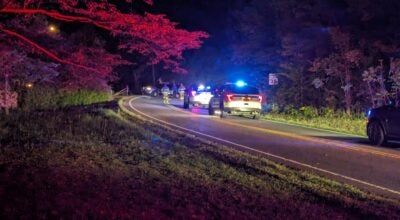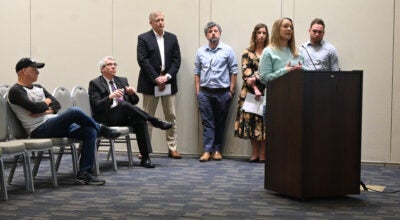Election: John McCain: The battle-scarred warrior rights on
Published 12:00 am Monday, November 3, 2008
By Nancy Benac
Associated Press WASHINGTON ó John McCain knows what hopelessness feels like.
He attempted suicide as a Vietnam prisoner of war. His young political career took a head-on blow in the Keating Five scandal. He’s gone three rounds with melanoma. His quest of the presidency has been pronounced dead more than once.
Hopelessness, McCain says on the campaign trail, is “an enemy who defeats your will.”
“I felt those things once before,” he says of his years in Vietnam. “I will never let them in again.”
And so it is that John McCain, at 72, fights on, a battle-scarred warrior.
His refusal to quit, his willingness to stand up against the tide, his ability to come back against seemingly insurmountable odds are the hallmarks of a lifetime in war and politics.
But McCain knows all too well that a fighting spirit may not be enough this time.
Two weeks out from the election, his back against the wall, McCain allowed a moment of reflection about “a life that’s been blessed” when asked about the possibility that he could lose.
“Look, I’ve had a wonderful life,” he said. “I’m the most fortunate man on earth.”
Before Vietnam
By the time McCain was shot out of the sky over Vietnam at age 31, he’d already crashed a plane into Corpus Christi Bay, ejected from another jet that flamed out as he was flying solo, survived an explosion aboard the carrier Forrestal that left 134 dead and generally lived large, as he once said of his grandfather.
He’d married a beautiful divorcee, adopted the former model’s two boys and had a daughter with her.
A predilection for what McCain describes as “quick tempers, adventurous spirits and love for the country’s uniform” was encoded in the family DNA.
His father and grandfather, the Navy’s first father-and-son set of four-star admirals, had set such a low standard for good behavior at the Naval Academy that John Sidney McCain III’s self-described “four-year course of insubordination and rebellion” got little more than a yawn from his family.
And yet, for all the raucous tales of misconduct, the midshipmen of the McCain family abided by the school’s honor code not to lie, cheat or steal.
McCain now pronounces his son Jack an exception to the family pattern of misbehavior at Annapolis, and jokes, “I’m astonished.”
During captivity
Tucked away in a corner of McCain’s Senate office, there is a yellowed, three-page telegram hanging in a black frame.
The once-secret cable recounts a conversation at the Paris Peace Talks between the top negotiators for the United States and North Vietnam.
In it, Averell Harriman, the U.S. negotiator, reports: “At tea break Le Duc Tho mentioned that DRV had intended to release Admiral McCain’s son as one of the three pilots freed recently, but he had refused.”
The cable was written in September 1968. It would be 41/2 more years before “Admiral McCain’s son” came home.
His captors had hoped to use early release of McCain ó whose father was soon to become commander of U.S. forces in the Pacific ó as a propaganda ploy. When McCain refused to play along, they told him: “Now it will be very bad for you, Mac Kane.” And they were true to their word.
McCain returned home from his 51/2 years as a POW on crutches and unable to lift his arms. He still can’t raise them above his head.
He says he’s “never known a prisoner of war who felt he could fully explain the experience to anyone who had not shared it.”
He seems more at ease joking about his incarceration than analyzing it.
When a Senate aide’s child got into hot water at school, McCain once advised, “Tell him to confess. Say, ‘I am a black air pirate, and I have committed crimes against the peace-loving people at my school.’ It always worked for me.”‘
The advice evoked his darkest hour in Vietnam, when McCain’s will was broken and he signed a confession that said, “I am a black criminal, and I have performed deeds of an air pirate.”
For all of that, though, McCain defied his guards. To his captors, just as to his superiors back at Annapolis, he was exasperating.
“He had to carry a different burden than most of us, and he handled it beautifully,” says Orson Swindle, a former POW cellmate who remains a close friend. “He didn’t need any coping mechanism; that’s just built into him.”
McCain tells AP that Vietnam “wasn’t a turning point in me as to what type of person I am, but it was a bit of a turning point in me appreciating the value of serving a cause greater than your self-interest.”
It taught him, he says, “that if you put your country first, that everything will be OK.”
After Vietnam
McCain’s experience in Vietnam gave him new confidence in himself and his judgment. But it did not tame his wild side, and his marriage was a casualty. One month after divorcing his first wife, Carol, McCain married Cindy Hensley, 17 years his junior.
McCain was lucky: Carol McCain, who had been in a crippling car accident while her husband was imprisoned in Vietnam, let him out of the marriage without theatrics or recriminations.
In one day, McCain signed his Navy discharge papers and flew West with his new wife to his new life. By 1982, he’d been elected to the House and four years later to an open Senate seat.
McCain set about establishing a conservative voting record and a reputation as a tightwad with taxpayer dollars. But just months into his Senate career, he made what he’s called “the worst mistake of his life.” He participated in two meetings with banking regulators on behalf of Charles Keating, a savings and loan financier who was later convicted of securities fraud.
The S&L situation simmered for a few years but eventually boiled over, and McCain got burned.
As the industry collapsed, McCain was tagged as one of the Keating Five ó senators accused of trying to get regulators to ease up on Keating. McCain was cited for a lesser role than the others by the Senate Ethics Committee, which faulted his “poor judgment.”
McCain spent years trying to live down the taint. He became the standard-bearer for reforming campaign donations. He railed against pork-barrel spending. He even attacked the senators’ own perks of office, like reserved parking spots at Washington airports.
That helps explain why John McCain is not the most popular senator on Capitol Hill. But it is not all.
McCain is famous for expletive-laced outbursts at his colleagues: “Only an aóó would put together a budget like this,” he once told the former Budget Committee chairman, Sen. Pete Domenici, R-N.M.
Former Republican Sen. Bob Smith remembers an altogether different dynamic, particularly between McCain and fellow Republicans.
“He definitely could intimidate people,” says Smith.
“Beware if he says, ‘My friend.’ You better look out.”
Looking ahead
McCain loves the naval expression to “keep a steady strain” on the lines between ships. It’s his way of telling aides and supporters not to get too cocky in the good times, too low when times are tough.
He’s seen it all come together ó and apart ó more than once.
His upstart bid for the presidency in 2000 took flight in New Hampshire only to get flattened by an ugly whisper campaign against his family in South Carolina.
McCain’s campaign for the GOP nomination this time all but destructed last summer as he ran out of money, and there was a staff exodus after a power struggle and leadership shake-up. But he battled back.
“He put the campaign on his back and climbed up a mountain alone,” says good friend Sharon Harper, who lives next door to McCain in Sedona.
His path to the nomination this time inevitably invited comparisons to his insurgent campaign of 2000; it seemed less freewheeling this time, more calculated. His shifts on issues such as taxes and immigration seemed designed to placate the right.
Former Sen. Lincoln Chafee, who backs Obama, credits McCain for going his own way in the Senate but worries that in reaching out to the right during the campaign, he’s “compromised his credibility.”
Gary Hart, another Obama supporter, doubts McCain is a new man. “I don’t think you get to be 70 years old and then fundamentally change,” says Hart. “McCain’s gyrations have more to do with figuring out his own party than anything else. … He’s had to sublimate for obvious reasons.”
McCain bats away that notion.
“In all due respect to my colleagues, they’re drinking the Kool-Aid that somehow I have changed positions on the issues. All I can say is that we all grow. We all grow wiser. And we all refine our positions.”




